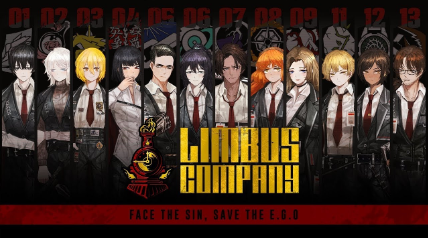Christmas break is undeniably a blessing for all involved. Teachers get a rest from grading tests and managing unruly students, and we, the students, get a well-needed respite from the stresses of homework and looming tests. And yet, what does one do with two weeks of newfound free time? Of course, we all celebrate the holidays – we go shopping, have parties, and generally make merry. But there is still downtime, especially after the new year begins and the festivities run their course. So, how do we fill that gaping chasm of boredom?
Most people, including myself, would naturally include video games in the solution. If you’re looking for something new to play this holiday season, allow me an unsolicited recommendation.
Limbus Company is a relatively newfound favorite of mine and relatively new in general – it was only released in early 2023. But it’s a title that, despite its newness, unfinished state, and lowly position as a free-to-play mobile gacha RPG – don’t click away yet, I promise it’s not as bad as it sounds – deserves much praise.
Let’s put it in context first, shall we? Limbus Company was made by the South Korean indie studio Project Moon and set in the same world as their other two games: the SCP-inspired management simulator Lobotomy Corporation (if that’s not a title that gets your attention, I don’t know what will) and the more classical visual novel-style RPG Library of Ruina. This setting is ‘the City,’ a very aptly-named anarcho-capitalist dystopia whose government is controlled by a handful of mega-corporations, each named after a different letter of the alphabet and, due to its place in the distant future, founded upon pieces of hyper-advanced technology not too different, in practice, from magic. Some can manage the distribution of time, others can heal wounds in seconds, others still can turn you into an insectoid super-soldier (remember that, it’s gonna be important later), et cetera, et cetera. There’s more – a lot more – but those are the basics.
With that out of the way, what is Limbus Company itself about? Well, to put it simply, you are Dante, an amnesiac with a flaming clock for a head who, almost immediately upon waking up in the middle of a misty forest and being saved from death by a well-timed bus, is thrust with the responsibility of managing the titular Limbus Company. Specifically, you oversee the Bus Department, which is tasked with retrieving artefacts called Golden Boughs and, in the process, helping their employees deal with their various psychological traumas.
This brings me to my first point of praise for this game: its characters. Every member of the game’s twelve-piece main cast is unique, even in outward appearance. You may recognize a few of them, such as the perpetually-tired Gregor, who sports the arm of a cockroach in homage to his literary counterpart, featured in AP Literature. Mythology nerds like myself may be delighted to meet the curt and military-minded Outis, who takes her name from one of Odysseus’ epithets in Homer’s Odyssey. Yes – all of these characters are heavily inspired by classic literature: the cast includes quick-tempered Heathcliff (Wuthering Heights, which Mrs. McInvale will doubtless appreciate), friendly Rodya (Crime and Punishment), and (my personal favorite) the level-headed and sensible Ishmael (Moby-Dick), among others. Even Dante is named after the author and self-insert main character of the Divine Comedy, which also inspired this game’s story structure. This inspiration goes beyond just their names, providing the basis for their characterization in general as well as their backstories. Yet Limbus Company also provides its own spin on the characters, breathing new life into them and elevating them from simple adaptations to their own entities. Not to mention how it manages to take twelve unrelated stories from all around the world and throw them together in a cohesive, natural way.
These characters are, naturally, the driving force for the game’s story, but that story is also wonderful in its own right. Each canto (or chapter, in less pretentious terms) is many times better than the last, building off the foundation of the previous cantos, the source material, and the rich lore of the City. Much like the characterization of its cast, Limbus Company allows the source materials to shine through in its narrative but also provides its own take on them, resulting in a deeply engaging campaign that only keeps improving. New players don’t even need to have read the books to appreciate it (though I would certainly recommend it, as it enhances the experience further). Furthermore, the story is still in progress, leaving room for endless speculation and even more improvement.
But of course, bad mechanics can make any game, regardless of the quality of its story, difficult to play. Not to worry – Limbus Company doesn’t suffer from this problem. The gameplay is multi-layered while still remaining simple and easy to understand. It fits any style of play, whether you like to strategize and craft perfectly synergized teams or use all your favorites for every battle. Even outside of combat, its user-friendliness is seldom matched: the main screens are easy to navigate, the gacha system is remarkably fair, the in-game currency is abundant, and the battle pass isn’t even a necessary investment, making it completely free-to-play if you opt-out. There aren’t even any ads!
Of course, it’s not a perfect game. Much like Project Moon’s other titles, it does suffer from sudden difficulty spikes (looking at you, Ricardo), some balancing issues in the early game, and an unhelpful tutorial. The first two cantos aren’t amazing either, as they seem to be mostly there for exposition rather than actual character development (sorry, Gregor and Rodya). However, these issues vastly improve the further into the game you get, and they don’t make the game any less of an enjoyable experience.
There’s much more I could discuss: art direction, music design, and voice acting. But I hope I’ve convinced you or at least piqued your interest in this game. If you’re looking for a new game to start this holiday season or just browsing titles out of boredom, I highly encourage you to check out Limbus Company.









































